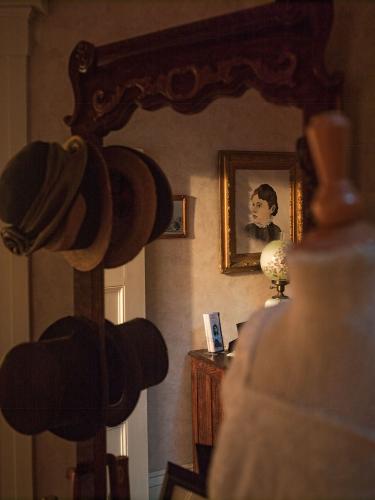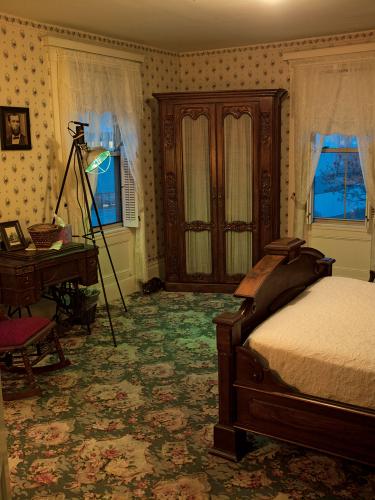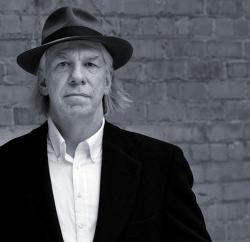
On October 20, 2015, Lee-ann Wilber spoke with Jack Hitt as part of the ongoing series “Amateur Hour,” in which various tinkerers, zealots, and collectors discuss their obsessions. Wilber runs the Lizzie Borden Bed & Breakfast Museum, in Fall River, Massachusetts, where, in 1892, Borden’s father and stepmother were brutally murdered. Borden, the only individual tried for the crime, was ultimately acquitted. It was one of the first American murder trials to become an international media sensation. The conversation that follows has been edited for brevity and meaning.
Jack hitt: Given that you’ve been doing this for a while, I assume there are enough people who want to sleep at Lizzie Borden’s that it’s a business?
Lee-ann Wilber: Well, we’re a museum seven days a week. And people can stay overnight five nights a week. I had 150 people come through the house on tour today, and we’re booked at night for the next two weeks. We slow down in winter, only allowing people to sleep over three days of the week; in the summer, five nights. But October, leading up to Halloween, and late summer—the killings occurred on August 4, 1892—we are always booked. We are closed on Mondays and Tuesdays so that our housekeeper doesn’t run away.
Where can you sleep?
There are six bedrooms, and we have eight beds as well as four roll-away beds. The third floor includes the Bridget Sullivan Room, that’s the Bordens’ maid, along with two other rooms called the Hosea Knowlton and Andrew Jennings rooms—those were the prosecuting and defense attorneys at her trial. On the second floor is the bedroom of Lizzie and her sister, Emma. And there is her parents’ master bedroom where her father, Andrew Borden, and her stepmother, Abby, slept. And you can stay in the room where Mrs. Borden’s body was found—the John V. Morse room, named for Lizzie’s uncle who stayed with them in the house the night after the murder. So at any one time I might have as many as twenty people sleeping in the Lizzie Borden house.


Which is the most popular?
It’s probably a draw between the Morse and Lizzie bedrooms.
The father’s room is not desirable?
He died in the sitting room, which is a common area downstairs on the first floor. He was found on the sofa, so the sofa there gets sat on a lot.
Is it the sofa?
No one knows what happened to the original sofa. Much of the furniture went with Lizzie and Emma when they later moved up the hill. They took what they needed and the rest was lost over time.
How did you come to this job?
My mother gave me a gift certificate to spend the night here. I decided to use it on Valentine’s Day and I brought my new boyfriend. We had been dating about a year. So I surprised him.
I need to ask you about your relationship.
We were just at the point where we knew each other, but I was still testing him. You know, when you push their buttons to see how they are going to react? So I invited him to spend the night in Lizzie Borden’s house. I figured if he was around after this trip, he was worth keeping.
When did that happen?
That was in 2003, and one day Donald, my business partner, called me at work—I was the manager of a vitamin-and-supplement store—and he said it was for sale. I asked him, “Why are you telling me this?” He said, “You’d be perfect for this job.” After a couple more weeks at work, hearing things like, “Your numbers are great but could be doing better,” I decided that if I was going to pull these kinds of hours, then I might as well do something I enjoy, work for myself, and preserve a piece of American history. How many chances like this come along in a life?
Just what kinds of people come here?
We get people who are interested in history, lawyers, criminal-justice students, we get that side of it—trying to go over the evidence, maybe come up with a new theory. And we also get a lot of people interested in the paranormal who want to investigate around the house while they stay here. They come here with their meters. People do séances regularly, and they bring their cards to do readings, their crystals, and of course the Ouija board.
Have you ever seen a ghost?
I have had some weird things happen to me in eleven years. The third floor really likes to mess with me. There’s some normal stuff, like lights that go on and off. I have been in the house alone and it sounds like someone is walking on the floor above me. I have been touched. My first week here I was touched. It felt like someone ran her finger down my back. That was kind of interesting.
Have you ever been deeply disturbed by something that happened here?
Several years ago I was sleeping up in Bridget’s room on the third floor. I was alone in the house. There is a little child’s rocking chair to the left of the bed and when I woke up the next morning, the rocking chair had shifted around to the right side of the bed like it was watching me sleep. So that bothered me a little bit.
Why would you do this?
Like a lot of people, I like to explore unsolved crimes, and I’ve always been interested in the Jack the Ripper case and murder mysteries, and this is one of the biggest mysteries of the Victorian era. I grew up in Rhode Island, and I have always known about the case, being practically next door.
I am a fan of murder mysteries, too, and even as a healthy skeptic, I’m not sure I would have the guts to sleep alone in Lizzie Borden’s bedroom.
That’s why I offer day tours.
For chickens like me?
Or for people who are just driving through town.
Wanting to learn is one thing, sleeping in a crime scene is another.
They teach classes on this in Europe. It’s called dark tourism. There’s an academic center, the Institute for Dark Tourism Research at a university in England. I have some research right here; it’s defined as “involving travel to sites historically associated with death and tragedy.”
I saw it referred to somewhere as “thanatourism.”
Also “grief tourism” or “black tourism.” And it’s a worldwide phenomenon. People visit the sites of Jack the Ripper. But people also travel to Auschwitz, the Normandy landing, the Tower of London. A couple of years ago, a couple visiting us had been down to Krakatoa, where the island volcano blew up in the 1880s, killing 36,000 people—so many places full of history and not all of it good.
Regarding dark tourism in America,
besides Lizzie Borden, what other sites does one hit?
The Villisca axe-murder house in Iowa is crucial. You can sleep there, but you have to bring a sleeping bag. There’s no electricity and there’s no tour.
I heard that the California home of 1980s serial killer Dorothea Puente is being opened for tours.
There’s another one in Rhode Island. It’s called the Valley Inn, a historic replica of the home where Rebecca Cornell was murdered more than 300 years ago. She burned up, and they thought it was an accident. Her brother dreamed that she spoke to him and implicated her son Thomas. He was hanged for the crime—the only conviction, they say, with evidence given by a ghost.
And that’s a B and B.
Better: It’s a restaurant.
So the whole family can go.
By the way, Thomas’s wife was pregnant when he was executed. The child, named Innocent Cornell—for obvious reasons—is Lizzie’s direct ancestor.
Why is this arguably the most notorious murder in America?
It’s one of the first media-fueled crimes. The press got a hold of it and in days it had gone around the world. The telegraph had been around a while, but the telephone was new. Between the telephone and the newspapers, this crime became a worldwide phenomenon.
I see that there is an online game on your website—and that it’s really popular, too. What do you think draws so many people to the Lizzie Borden story as opposed to all the other murders in America?
I think because of the brutality of the crime and the fact that a woman was accused of it. If you look at Victorian murderers, as far as women go, almost all of them are poisoners. Most people do not associate this kind of bloody crime with a woman.
What do you suspect really happened?
If Lizzie didn’t commit the crime herself, she had to know who did.
Am I wrong in thinking that people believe she did it and got off?
It’s a fifty-fifty split if you ask people after they take the tour. Some come in thinking “guilty” and take the tour and change their mind, and some say she didn’t do it and take tour and say, “Oh, of course she did it.”
What is the most exonerating piece of evidence?
She was seen moments after she discovered the father’s body by a neighbor, Mrs. Churchill, who didn’t see any blood on her body.
And the most incriminating?
There were only three ways into house—the front door was triple locked, the basement locked from inside and the side door, too. Mrs. Borden had gone back upstairs to make the bed in the room where John Morse had slept, and Lizzie said she didn’t hear anything even though she never left the house. Mrs. Borden was murdered an hour and a half before Mr. Borden came home from work.
Were there any family issues?
It’s known that the girls did not like the stepmother and told anyone who would listen. Mr. Borden’s first wife, Sarah, died when Lizzie was about three years old and Emma was twelve. Emma stated later that she made a vow to her mother on her deathbed to take care of her sister. Two years later, Mr. Borden was getting remarried. So if anyone had any resentment it was the older girl. Emma had only referred to her stepmother as Mrs. Borden or Abby, which was very disrespectful for a child at the time. Lizzie had called her “mother” up until a few years before the murders. Something changed. So this was a house with a lot of tension.
Are there different schools of thought today about who did it?
Oh, yeah. The suspect list runs the gamut from Lizzie to a mysterious stranger. A couple of people insist that Emma committed the crime. Some people think Uncle John did it. And there’s always the Mysterious Stranger theory—someone got into the house and committed the crime and hid in the house for an hour and a half until Mr. Borden came home.
Sounds to me like it was Lizzie.
Mr. Borden’s door is locked. And then you would have to know where everybody in the house is at all times. The maid, Bridget, was outside washing the windows but then she came inside and she is the one who let Mr. Borden in the house. When she went to the front door to let Mr. Borden in she struggled with the locks and swore. She said she heard Lizzie giggling upstairs. So if Lizzie is in her bedroom then that means the mysterious killer is still upstairs somewhere and Lizzie knows nothing about it. And how does Lizzie not see her stepmother’s dead body? When Bridget and Mrs. Churchill go upstairs later, the door to Morse’s room is open wide enough for them to easily see Mrs. Borden’s body slumped on the floor.
Did anyone suspect the housekeeper?
The police did look at her but she was dismissed very quickly.
I read Lizzie was possibly having a love affair with the housekeeper Bridget and Mrs. Borden found out and didn’t approve.
There are many theories.
Is there anybody else in the neighborhood—enemies of Mr. or Mrs. Borden?
Mr. Borden did have quite a few enemies around town. He was a banker.
Who do you most suspect?
I pretty much think it was Lizzie.
You’ve done some rehab to the house. Was that to make it cozier in some bed-and-breakfast way, or was it historical nursing?
It looks like a Victorian house—so that when you walk into it you feel like you’re walking back into the 1800s. So it’s as comfortable as a Victorian house could be and, let me tell you, the furniture is not comfortable. But the beds are!
How exactly did Mr. and Mrs. Borden die?
Mrs. Borden received nineteen blows from a hatchet. She was facing her attacker so the first hit landed on the left side of her face just below her ear. She went down and the killer straddled the body and delivered seventeen more blows to the head and then one blow between the shoulder blades. Mr. Borden received ten blows to his face while lying on the sofa.
And we never found the hatchet?
Well, there were several hatchets in the house and Bridget pulled them all out and showed them to the police. It was not uncommon to have a hatchet in your house back then because one had to cut firewood for the stove. On the day of the murder, the police discovered a hatchet head in the basement. They looked at it and then put it back on the shelf. Later, they took it in as evidence. That hatchet head is now at the Historical Society here in Fall River.
What was she like for the rest of her life?
She lived about a mile from here. She was not leaving town. She wanted to be here for when the day came that they found her absolutely innocent.
Did she marry?
Neither she nor her sister ever married.
Did they live together?
They did until 1905 when Emma moved out, saying that Lizzie had become unbearable to live with and she wouldn’t stay any longer.
When I first called you, you got another call and I wrote it down: “Lizzie Borden Bed & Breakfast Museum … yes … the first blow was to the left side of her face just in front of her ear and then seventeen hits to the side of her head and one between the shoulder blades. You’re welcome!” What was that about?
Happens a lot in the fall. People want their costumes historically accurate. So I tell them the precise details.
Do you get other kinds of phone calls?
People call to see if they’ve read correctly: “Are you really a B and B? Can I really stay there?” Sometimes I get prank phone calls: “Hello, is Lizzie Borden in?” And I always say, “No, she’s not in right now, can I take a message?” One time, the guy said, “Yes, I just wanted to tell her I am a big fan. I really like her movies. I have almost all of them.” It took me a second to realize he was calling for Lizzy Borden the former porn actress and professional wrestler. She visited once.
You get famous visitors?
A long time ago, Mickey Rooney stopped by with two of his sons, as did Liberace. More recently, Chloë Sevigny has been here twice. Cassandra Peterson, who is Elvira, the Mistress of the Dark, was here. And Miranda from Sex and the City. Most recently, Dave Davies of the Kinks.
Do people think that it’s just fine that other people are sleeping in a murder scene?
I occasionally get an e-mail because they don’t want to say it to your face. So it’s always anonymous: “How could you ever make money off of such a horrible crime?” And my reply is: “Well, I am keeping a piece of history alive, I am keeping about fifteen people employed.” I mean, how many people go to Gettysburg? Think of the massive atrocities that took place there—and they have a welcome center.







